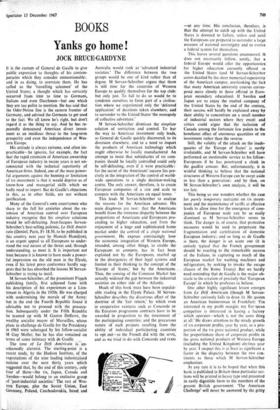Yanks go home BOOKS
JOCK BRUCE-GARDYNE
It is the custom of General de Gaulle to give public expression to thoughts of his contem- poraries which they consider unmentionable: and in so doing, to overstate them. He has called us the 'travelling salesmen' of the United States; a thought which has certainly occurred from time to time to Germans, Italians and even Dutchmen—but one which they are too polite to mention. He has said that the Oder-Neisse line is the eastern frontier of Germany, and advised the Germans to get used to the fact. We all know he's right, but don't regard it as the thing to say. And he has re- peatedly denounced American direct invest- ment as an insidious threat to the long-term prosperity and even the independence of Wes- tern Europe.
His attitude is always extreme, and often im- practicable—he ignores, for example, the fact that the rapid extension of American ownership of European industry in recent years is not un- connected with the technical superiority of American firms. Indeed, one of the most power- ful arguments against the banning or limitation of us investment is that it would deprive us of know-how and managerial skills which we badly need to import. But de Gaulle's objections in this, as in other fields, are not without justification.
Many of the General's own countrymen who share to the full his anxieties about the ex- tension of American control over European industry recognise that his simpliste solutions would be self-defeating. Jean-Jacques Servan- Schreiber's best-selling polemic, Le Defi Ameri- cain (DeniSel, Paris, Fr 18.50,.to be published in this country next year by Hamish Hamilton), is an urgent appeal to all Europeans to under- stand the real nature of the threat and, through understanding, to meet it. It is important not least because it is known to have made a power- ful impression on the old man in the Elysee, even if his latest press conference hardly sug- gests that he has absorbed the lessons M Servan- Schreiber is trying to instil.
M Servan-Schreiber, of the prominent Fisnch publishing family, first achieved fame with his description of his experiences as a Lieu- tenant in Algeria in the 1950s. He was charged with- undermining the morale of the Army: but in the end the Fourth Republic found it advisable not to proceed with the prosecu- tion. Subsequently under the Fifth Republic he teamed up with M Gaston Defferre, the wealthy socialist mayor of Marseilles, 'whose plans to challenge de Gaulle for the Presidency in 1965 were sabotaged by his fellow-socialist M Guy Mollet; but he has also remained on terms of some intimacy with de Gaulle. iu
The tone of Le Defi Americain is- un- ashamedly alarmist. The starting-point is a recent study, by the Hudson Institute, of the expectations of the nine leading industrialised nations over the next thirty years villich suggested that, by the end of this century,- only four of them—the us, Japan, Canada and Sweden—would belong to an exclusive group of 'post-industrial societies.' The rest of Wes- tern Europe, plus the Soviet Union, East Germany, Poland, Czechoslovakia, Israel and Australia would rank as 'advanced industrial societies.' The difference between the two groups would be one of kind rather than of degree. M Servan-Schreiber argues that there is still time for the countries of Western Europe to qualify themselves for the top dub: but only just. To fail to do so would be to condemn ourselves to form part of a civilisa- tion where we experienced only the 'deferred application' of decisions taken elsewhere, and to surrender to the United States 'the monopoly of collective adventure.'
M Servan-Schreiber dismisses the simpliste solution of restriction and control. To bar the way to American investment only leads, as General de Gaulle quickly discovered, to its diversion elsewhere, and to a need to import the products of American technology which might otherwise be locally manufactured. An attempt to insist that subsidiaries of us com- panies should be locally controlled could only be self-defeating, even if it were practicable: for the secret of the Americans' success lies pre- cisely in the integration of the control of world- wide operations in a single decision-making centre. The only answer, therefore, is to create European companies of a size and scale to compete with the Americans on equal terms.
This leads M Servan-Schreiber to analyse the reasons for the American advance. His main diagnoses are two: that the Americans benefit from the immense disparity between the proportions of Americans and Europeans pro- ceeding to higher education, and from the enjoyment of a huge and sophisticated home market tinder the control of a single national government. He exposes convincingly how the economic integration of Western Europe, intended, among other things, to enable the Europeans to compete, has in fact been exploited not by the Europeans, snarled up in the divergences of their legal systems and limited in their thinking to the concept of the `Europe of States,' but by the Americans. Thus, the coming of the Common Market has actually widened the gap between the industrial societies on either side of the Atlantic.
Much of this book must have been unpalat- able reading in the Elysee Palace. M Servan- Schreiber describes the disastrous effect of the doctrine of the 'fair return,' by which even in cooperative ventures such as Concorde or the Euratom programme contracts have to be awarded in proportion to the investment of the participating countries; and the precarious nature of such projects resulting from the ability of individual participating countries to opt out—as the French did with the AFVG, and as we tried to do with Concorde and ELDO
—at any time. His conclusion, therefore, is that the attempt to catch up with the United States is doomed to failure, unless and until the Europeans are prepared to surrender a large measure of national sovereignty and to evolve a federal system for themselves.
This leaves several questions unanswered. It does not necessarily follow, surely, that a federal Europe would offer the opportunities for higher education currently offered in the United States (and M Servan-Schreiber seems dazzled by the sheer numerical superiority of the American campus, overlooking the fact that many American university courses corres- pond more closely to those offered in Euro- pean secondary education). If Sweden and Japan are to enjoy the exalted company of the United States by the end of the century, their success will hardly be explained away by their ability to concentrate on a small number of industrial sectors where they excel: and critics could argue that the inclusion of Canada among the fortunate few points to the beneficent effect of enormous quantities of us investment rather than the reverse.
Still, the validity of the attack on the inade- quacies of the 'Europe of States' is surely irrefutable, and M Servan-Schreiber will have performed an inestimable service to his fellow- Europeans if he has penetrated a chink in the gaullist armour. But, unfortunately, it is wishful thinking to believe that the national structures of Western Europe can be swept aside in less than a generation: and by then, on M Servan-Schreiber's own analysis, it will be too late.
This being so one wonders whether the case for purely temporary restraints on us invest- ment and the maintenance of tariffs at effective levels to allow time for the emergence of com- panies of European scale can be as easily dismissed as M Servan-Schreiber seems to think. The danger is, of course, that protective measures would be used to perpetuate the fragmentation and cartelisation of domestic European industry:- and so long as de. Gaulle is there, the danger is an acute one (it is entirely typical that the French government should be reacting to the remarkable success of the Italians, in capturing so much of the- European market for washing machines and refrigerators, by seeking to invoke the escape clauses of the Rome Treaty). But we hardly need.reminding that de Gaulle is the major ob- stacle to the creation of precisely that 'European Europe' in which he professes to believe.
One other highly significant lesson emerges from Le DO Americain (though M Servan- Schreiber curiously fails to draw it). He quotes an American businessman in Frankfurt: `I'm interested in my profit margin; my Eurvean competitor is interested in having a factory which operates—which is not the same thing at all.' He draws attention to the steady growth of us corporate profits, year by year, as a pro- portion of the us gross national product, while the proportionate share of corporate profits in the gross national products of Western Europe (including the United Kingdom) declines year by year. I suspect this is at least as significant a factor in the disparity between the two con- tinents as those which M Servan-Schreiber emphasises.
At any rate it is to be hoped that when this book is published in Britain these particular sec- 'tions will be printed in heavy type and presented in easily digestible form to the members of the present British government. 'The American Challenge' will never be answered by the gritty
'technological' phrasemaking of you-know-who and his Mintech. But suppose we suddenly began to pay the respect to profits and profit- ability which is taken for granted in the United States. Then we might be getting somewhere.



































 Previous page
Previous page